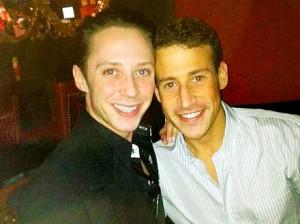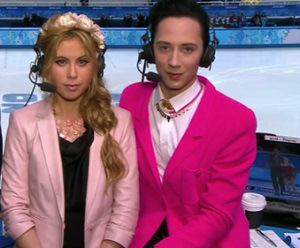Johnny Weir’s Divorce and the Burden of Representation
More interesting than the current wave of TMZ coverage and tell-all Access Hollywood interviews, though, was the absence thereof before the official divorce announcement on March 19th. On February 11th, Voronov tweeted a photograph of the temporary restraining order he had filed against his husband, which detailed the night Weir allegedly assaulted Voronov and was subsequently arrested. Though the tweet was later deleted, it remained uploaded long enough for fans to save and repost it on various forums. And yet, the celebrity media, usually eager to sniff out scandal (especially scandal backed up by legal documents) remained silent.
On the surface, this may be unsurprising. The mainstream media has a long history of turning a blind eye to accusations of domestic violence leveled at male athletes; this may, actually, be the most masculine-coded role Weir has ever played in a media narrative. But the all-pervasiveness of the media silence is notable, and more likely stems from the fact that, at the time of the aforementioned tweet, Weir was in Sochi, Russia, covering the Olympic figure skating events for NBC alongside fellow former Olympian Tara Lipinski. Weir and Lipinski were the media darlings of the Sochi Olympics, lauded for their flamboyant outfits and keen commentary alike; in the aftermath of the Games, NBC even gave them a spot covering fashion at the Academy Awards. NBC had an obvious financial stake in not letting its star commentator fall from grace in the middle of its Olympics coverage.
But the American media also had a political stake in not letting Weir, an openly gay former U.S. Olympian, become the face of same-sex domestic violence. Russia’s recent anti-gay legislation had become one of the biggest media talking points of the Sochi Games, and much of the moral high ground the U.S. held came from the recent Supreme Court dismantling of the Defense of Marriage Act and the country’s overall better track record on LGBT issues. The last thing anyone wanted to give Russia was evidence that the most visible gay man at the Games was in a same-sex marriage that wasn’t working.
Ironically, Weir himself, a known Russophile, had already found himself embroiled in controversy when he expressed his support for the U.S. presence at the Sochi Games and decried the anti-Russia protests organized by various LGBT organizations. In an article for the Falls Church News-Press, Weir wrote, “Many activists also believe that change starts with a revolution, a term that terrifies me. I am not against activism in any way, but I don’t have the strength of character to not only revolutionize my life on a daily basis but also the lives of others.” This desire to distance himself from LGBT activism is consistent with past statements Weir has made – he has no interest in being a role model, and has always seemed much more comfortable with his media image as skating’s “wild child.”
Yet the burden of representation remains. Weir and Voronov’s marriage had already been framed as a success story on the road to full LGBT equality. Now that the divorce announcement is official and the Olympics are over, the media has seized on the story as Weir and Voronov engage in one of the most high-profile same-sex divorces in American legal history. Voronov’s crisis manager, Wendy Feldman, has made this unprecedented quality explicit: “This case is really a true test of equal rights — in marriage and now divorce,” she said, in a statement released soon after the divorce announcement. And Voronov, Weir, and the media alike aren’t keen to let anyone forget that this is a gay divorce. From Voronov’s claims that Weir “forced him out of the closet” and only married him because a “Georgetown-educated lawyer” would make for a useful character on his (now-defunct) reality show, to the debate about whether or not Voronov should have worked during their marriage (rather than letting Weir alone bring home the bacon), discursive constructions of heterosexual and homosexual gender roles have become integral to the media narrative surrounding the divorce.
The domestic violence accusations bring in another level of ugliness, especially after Weir’s no-holds-barred account of what “really” happened the night he was arrested, which includes implications of attempted rape on Voronov’s part. The divorce raises questions about the power dynamics of money, fame, perceived femininity, and domestic abuse, even as the more shallow media coverage focuses on Weir’s collections of furs and Birkin bags and Voronov’s demand that Weir return the family dog.
How Weir and the media handle the rest of the divorce proceedings will be telling. Weir’s star text, as a media personality and as one of a small number of openly gay American athletes, is at stake, but so is, despite Weir’s protestations, the popular image of gay marriage and divorce in America. Weir may not want to be anyone’s hero, but he likely doesn’t want to be anyone’s villain, either – and in the black-and-white world of media narrative, he may not get to choose.




